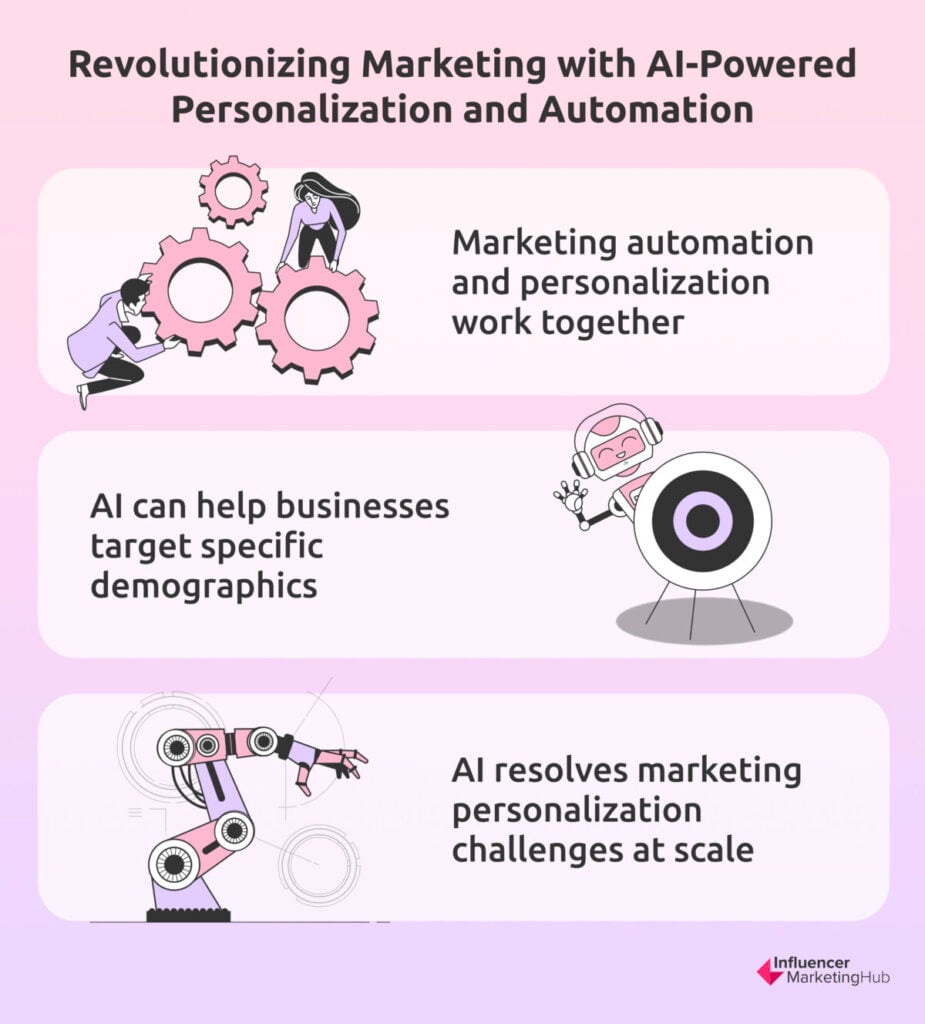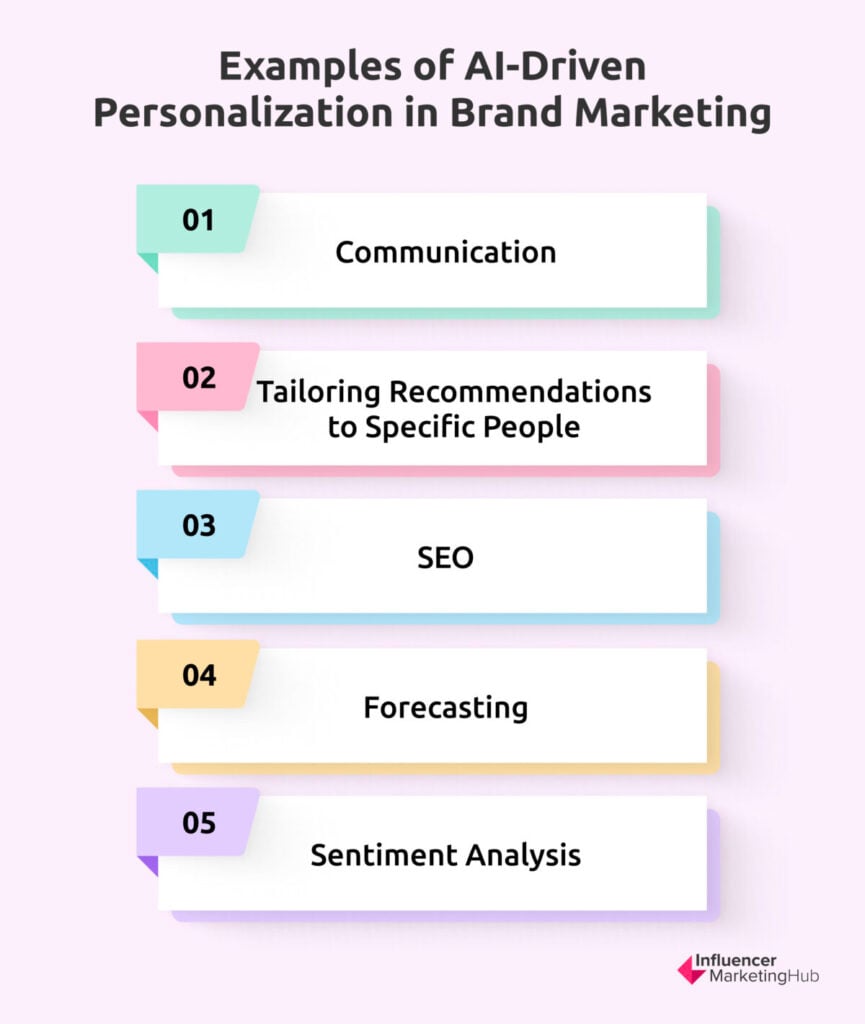Marketing personalization has become a cornerstone of modern strategy, with 88% of marketers citing improved customer experience as the primary reason for prioritizing it. Today’s consumers expect brands to deliver tailored interactions that go beyond generic ads and one-size-fits-all messaging. Whether they’re purchasing everyday groceries or splurging on luxury items, customers want personalized experiences that make them feel valued. For brands, this isn't just a trend but a vital way to build meaningful, long-term relationships with their audience.
As a result, nearly 50% of global B2C marketing leaders are now allocating more budget toward content and personalization technologies. Advances in AI and automation have made it easier to collect, analyze, and apply customer data, enabling brands to deliver personalized experiences at scale. By focusing on personalization, companies can enhance customer satisfaction, boost engagement, and differentiate themselves in an increasingly competitive marketplace.
Why Worry About Marketing Personalization?
As we saw above, today’s consumers expect some element of personalization from the firms they deal with. They dislike being treated like one of a herd of customers. Let’s be honest, everybody wants to feel a bit special, even if they are simply shopping for everyday items like groceries.
As TechTarget declares, personalization customizes experiences, offers, services, and interactions to help brands build connections with consumers. In the case of eCommerce, well-done personalization can replicate the experience of shopping in a physical store. Ideally, it will build lifelong connections with customers.
Think about how things used to operate pre-Covid. Your local supermarket might have mail-dropped a flier containing their specials for the week. Depending on your store, these may contain all its specials, from baby products to alcohol, or alternatively, they may have simply focused on the most popular deals. Nowadays, however, you are just as likely to receive an email highlighting a selection of the week’s specials. And the specials featured in your email will most likely be different from the selection of products shown in the emails sent to your friends. Why is this? Because they have used marketing personalization to determine which of the week’s specials would be most likely to interest you and attract your attention.
What’s the Problem with Marketing Personalization?
As we’ve seen, personalized marketing can be highly effective. However, it can be challenging to do at scale, unless you can automate at least part of the process. Going even further back with the foodstuffs example we gave above, small shopkeepers used to run local grocery shops – the corner store. At one time they would have known their regular customers well, chatting with them on every visit, and could easily promote any specials they knew would interest them.
As corner stores became supermarkets this personalization disappeared due to the sheer problem of scale. Once you have stores with multiple checkouts, operated by tens or even 100s of staff, serving 1000s of customers, you lose that personal touch. And of course, marketing has become more sophisticated and no longer just the role of one salesperson.
The main problem of marketing personalization is logistics, the employee time necessary for its success has traditionally made it uneconomic and impractical at scale. And to make personalization effective you need to collect a considerable amount of data, for example, previous purchases, customer support interactions, social media posts, browser history, etc. Before the advent of AI and marketing automation, most firms found marketing personalization an impossible pipedream. The best they could do was to place people into groups, often relatively broad in definition.
But knowing how beneficial personalization can be, many brands invested heavily in marketing automation to find other ways that they can replicate the old-fashioned customer experience and personalize at scale.
And along the way, marketers discovered that marketing automation and marketing personalization work together. While marketing automation can save businesses money and make them more efficient, consumers can be cynical of the results unless there is also personalization. Marketing automation without personalization can come across as insincere and lacking in authenticity.

How Can AI Help Things?
Today’s artificial intelligence technologies allow you to personalize your marketing messages at a scale previously unthinkable. If done well, you can share your marketing messages, even with the cynical Generation Z, without consumers feeling that you are treating them like a number.
You can’t get away with targeting general demographics anymore. You need to get much more laser focused in your personalization – a concept that would have been previously impractical. AI, allied with other marketing automation technologies, now makes the previously impossible possible, indeed relatively cost-effective, and easy.
Ways Brands Are Using AI-Based Marketing Personalization

1. Communication
Brands are using AI to help communicate with potential customers, ensuring they send the “right” message to the “right” people at the “right” time.
For example, we’ve previously written about how nearly every email tool contains some AI email marketing software element nowadays. Many brands use AI email marketing platforms to perfect their email marketing strategies, e.g. using AI to optimize their sending frequency. Email platforms now incorporate AI techniques to help their subscribers understand the kinds of emails to send, to whom, when, and how often.
Many of these platforms have widened their focus to incorporate other types of communication, such as messenger-type apps and even sending SMS texts.
2. Tailoring Recommendations to Specific People
This is one of the more visible examples of AI personalization. Every time you open Netflix, Prime Video, Disney+, or one of the many other video streaming platforms you see this in play – at least, if you log into your own profile, rather than just a generic one for your entire household. If you enjoy watching sci-fi shows like Stranger Things, you will notice that many of Netflix’s suggested movies and TV series for you to watch are also in the sci-fi genre. Similarly, if you’re more into snuggling down to romantic comedies, the streaming platforms will instead suggest examples of these for you to view. And if you’ve shown an interest in action blockbusters, you will find that Netflix will highlight their latest action movies in their recommendations list.
And Amazon is the master of using its AI tools to find the best products to recommend to you. At times you almost think that they have sneaked into your mind and extracted your purchasing wishes. Their product recommendations are generally uncannily accurate.
Another common use of this in recent times has been with chatbots. Many eTailers use their chatbots to recommend products to customers based on their previous purchases and stated intentions in the chatbot conversation. Chatbots can even establish when to offer loyalty-based discounts and rewards.
3. SEO
Google is rapidly discovering how AI is altering the way people search online. They reacted to ChatGPT’s release by issuing a ‘code red’ concern and approached founders Sergey Brin and Larry Page to create a competing AI chatbot. Some people have expressed concern that AI chatbots like ChatGPT could damage the use and viability of conventional search engines.
Not that we are at the point where everybody will shift from Google’s search engine to ChatGPT – the new technology still produces too many incorrect search results to yet be a viable alternative. But Google clearly sees that day as coming, and they are trying to ensure that they don’t become the Lotus123 or WordPerfect of search engines.
In the meantime, you will see considerable use of AI in SEO. In some ways, we’ve had this for years – with users receiving custom search results based on their location, devices, and past search history. However, webmasters and marketers can now use AI to build customized web optimization strategies.
We have previously examined in detail how brands can use ChatGPT to boost their SEO strategy. They can do this by using the AI chatbot to:
- optimize content
- summarize content
- generate ideas
- categorize content for semantic SEO
- paraphrase copy and content
- research keywords
- improve link-building strategy
- translate keywords
- write title tags and meta descriptions
- generate FAQs
- write ad copy
- write copy and CTAs for landing pages
- write product and service descriptions
- create newsletter templates
- create and manage analytics reports
4. Forecasting
One area where AI excels is in predicting the future. It can base its predictions on massive amounts of data, setting accurate confidence levels.
Marketers can use these forecasts to optimize customer journeys, with a reasonably high level of accuracy, adapting campaigns to lead where potential customers are likely to head. The more accurate the forecasts, the better the chances that brands will have the right amount of stock available at the right times and places to anticipate future customer demand.
To some extent, businesses have always done this. Fashion retailers have always had to buy inventory well in advance of there being a demand for it, basing their decisions on past seasonal sales, and trends elsewhere. Nowadays, forecasting can be so much more accurate with the ability to process massive quantities of data.
5. Sentiment Analysis
Brands can use AI-enabled sentiment analysis to determine how consumers feel in particular situations and then adapt their approaches accordingly. For example, some firms use sentiment analysis software to detect the emotional state of callers (and prospects in the case of outbound calls). This means salespeople/agents can modify how they handle a call to better suit a client’s emotional state.
The initial emotional states of a call’s participants will inevitably have a heavy impact on the success of the phone call. A call involving a nervous customer is likely to play out differently from one involving a happy customer or one involving an angry customer, even if the agent’s emotions remain neutral throughout the call.
For example, if we can assume that one of a call center’s major goals is to improve customer experience, then they should look closely at how their agents work with callers who are not in the happiest of mindsets when they initiate a call. Can you imagine dentists’ patients taking kindly to fake “Have a happy day” scripts and lengthy menus to navigate before they speak to a human?
AI sentiment analysis uses natural language processing (NLP) and machine language (ML) to help you automatically identify the emotional tone in comments. It can give you fast, real-time insights from large sets of customer data, making it easier for you to accurately personalize your offers or handle tricky situations with care.
Wrapping Things Up
The modern consumer hates mass-market advertising. While they may sometimes cringe at “creepy advertising”, wondering whether their phone or computer has been watching them like “Big Brother”, they still prefer ads served to be relevant to their needs.
However, it can be challenging to tailor everyone’s marketing experience. It involves collecting and maintaining an extraordinary amount of data. Until recently personalization has been beyond the capabilities of most businesses.
Artificial Intelligence (AI), Machine Learning (ML), and Natural Language Processing (NLP) have changed this, however. They have altered the way brands can interact with their customers, and now businesses of all sizes can personalize their marketing messages with relative ease. AI now makes an appearance in ways previously unimaginable, including AI-enabled avatars, robots, and door greeters, personalized AI-powered chatbots, personalized content, personalized messaging, personalized ad targeting and product recommendations, and customer sentiment analysis. And this is merely the beginning of the AI revolution currently underway.
Frequently Asked Questions
What is AI-driven personalization in marketing, and why is it important?
AI-driven personalization in marketing refers to the use of artificial intelligence to tailor content, ads, and customer experiences based on individual user preferences and behaviors. It's important because it enhances customer engagement, boosts conversion rates, and builds long-term relationships by making consumers feel valued through hyper-relevant interactions.
How can AI help marketers scale personalization without losing the human touch?
AI helps marketers scale personalization by automating data collection, analysis, and targeted messaging. AI tools analyze customer behaviors, preferences, and past interactions to deliver real-time, personalized experiences. Marketers can then focus on refining strategies and personal connections, ensuring the messaging feels authentic rather than robotic.
What are the main challenges of using AI for personalization in marketing?
The main challenges include managing large volumes of customer data, ensuring data privacy, and balancing automation with personalization. AI requires accurate data to function effectively, and without the right strategies, it can create irrelevant or impersonal experiences, undermining customer trust and engagement.
How do AI-powered personalization tools improve cold email campaigns?
AI-powered personalization tools improve cold email campaigns by analyzing recipient data, such as past interactions and purchase history, to craft tailored messages. These tools can optimize subject lines, content, and timing to make emails more relevant, increasing open rates and conversions while reducing the chances of appearing spammy or irrelevant.
What are some popular AI personalization tools used by marketers today?
Popular AI personalization tools include Salesforce Einstein, HubSpot, and Adobe Sensei, which help marketers create tailored customer experiences at scale. These platforms use machine learning to predict user behavior, optimize content recommendations, and automate personalized messaging across various digital touchpoints.


